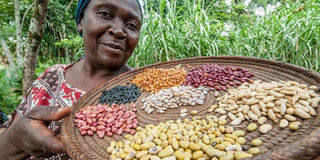Low seeds quality affecting returns in Comesa region

Poor quality seeds continue to affect productivity among Comesa member states. File photo
What you need to know:
- Prof Hamadi Iddi Boga, the Kenya agriculture ministry principal secretary, among others urged quick harmonization of the seeds policies.
Access to improved seeds by more than 80 million small-holder farmers in the Comesa region remains low standing at 23 per cent.
This has resulted in low productivity, especially for cereals such as maize, sorghum and pearl millet.
Despite Comesa countries having most of the global arable land, the region still grapples with food production.
Presenting the status report recently in Nairobi during a meeting on the Implementation of Harmonized Seed Regulations in Eastern and Southern Africa, Dr John Mukuka, a Comesa seed expert said: “The population in the Comesa countries is increasing at 2.3 per cent while food production was at 2 per cent, a situation that has brought about food insecurity to more than 130 million out of 600 million people in the region.”
Mukuka told the delegates who comprised of seed experts from 16 Comesa member states only seven out of the 21 states in the eastern and southern Africa have so far harmonised national seed regulations with the regional seed trade harmonisation regulations.
These include Uganda, Burundi, Kenya, Malawi, Rwanda, Uganda, Zambia and Zimbabwe.
The harmonisation was adopted by the Comesa council of ministers in 2014, as a strategy to trigger seed trade, which is currently low across the region and a cause for food insecurity.
The other components that Comesa has lined up for harmonisation in 2019 include fertilizer standards, grades and standards for staple foods (maize, beans and rice), warehouse receipt system, implementation of the regional food balance sheet including informal cross border monitoring and livestock feed sector.
Participants urged countries that have not yet harminised their seeds policies to speed up the process.
Prof Hamadi Iddi Boga, the Kenya agriculture ministry principal secretary, among others urged quick harmonization of the seeds policies.
In addition to the seven countries that have completed the harmonization process, an additional six have aligned their domestic seed laws with the regional regulations and are expected to join the list of compliant states by end of 2019. They include Djibouti, DR Congo, Egypt, Ethiopia, Mauritius, and Eswatini.
Comoros, Eritrea, Madagascar, Seychelles and Sudan have already launched the harmonisation plan and will soon begin the process.
Harmonisation
This will be done with provision of seed varieties from Comesa under the Seed Variety Catalogue.
Comesa Seed Harmonisation Implementation Plan is implemented by the Alliance for Commodity Trade in Eastern and Southern Africa (ACTESA), a specialised agency of Comesa and provides a framework of implementation plans and modalities at national and regional level to facilitate regional trade in the seed sector.
Meanwhile, Comesa has developed seed labels and certificates to facilitate regional seed trade.




